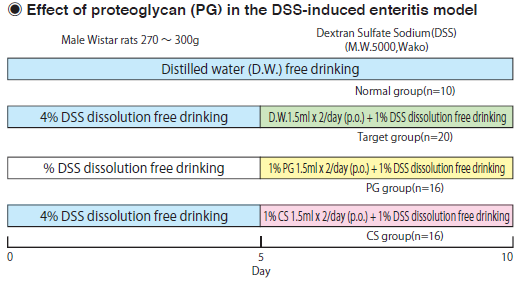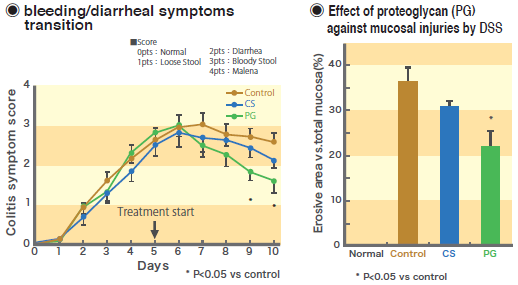Inflammation Bowel Diseases
Resolution for incurable diseases as inflammatory bowel diseases
by suppressing excess immune function
Normalizing function of intestinal tract
immune cells by making out a good
bacteria superior circumstance
It is also found that proteoglycan has an effect against inflammatory bowel diseases as "ulcerative colitis" and "Crohn diseases", the specified diseases as intractable diseases by Ministry of Health, Labor and Welfare.
The cause of inflammatory bowel diseases are not yet clarified, thus their remedies are not established. Moreover, designated victims of ulcerative colitis in 2012 were 77,073, and now it reaches 100 thousand people and still the number of patient are increasing year by year.
Against this serious disease, a study group led by Dr. Yoshihara in a surgery team of Hirosaki University clarified an improvement effect of proteoglycan in an experiment on mice.
Its mechanism has not been clarified yet but against inflammatory reactions that causes inflammatory bowel diseases, proteoglycan works to normalize the function of intestinal tract immune cells by changing circumstance inside the intestines to be good bacteria superior.
By suppressing excess inflammations, it is thought that proteoglycan influences the whole body immune system to work to keep the constancy of a living body.
Proteoglycan is confirmed to be absorbed from intestinal tract without being processed.
Especially, absorptivity in jejunum as a part of small intestine is high to be delivered not only inside intestine but all over the body soon.
Proteoglycan is expected to adjust immune function of the whole body to resolve various incurable diseases other than inflammatory bowel diseases.
■Application of proteoglycan on inflammatory bowel diseases
Hirosaki University, the second surgery and the first biochemistry(Shuichi Yoshiwara,Misato Ota,Kaoru
Kojima, Keiichi Takagaki, Mutsuo Sasaki)


◆Conclusion
・ Against the DSS-induced enteritis model, a treatment acceleration effect on enteritis was indicated with bleeding and diarrheal symptoms, hematological observation and histopathologic observation being improved by proteoglycan oral administration.
・n-butyric acid concentration within colon was significantly increased by proteoglycan oral administration.
・ From results above, it is indicated that the curative effect of proteoglycan against the DSS-induced enteritis model is possible to be brought about by increase of n-butyric acid.
Are you interested in Proteoglycans?
If you want to get it, visit this page.